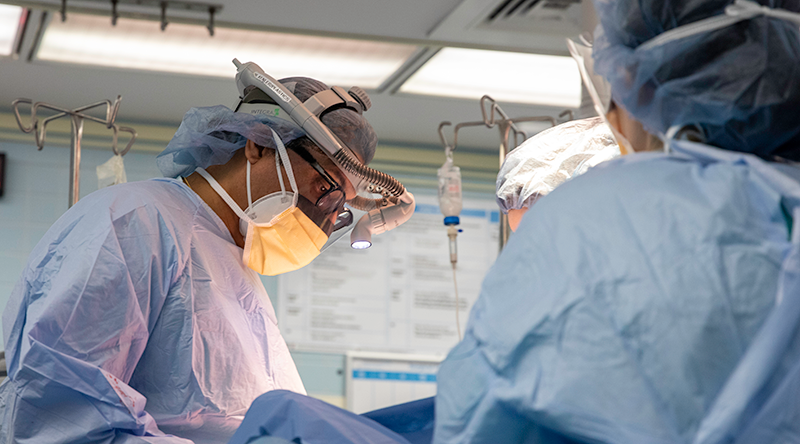
Popular Locations
- Outpatient Surgery - Bridgeport Hospital
- Park Avenue Medical Center
- Primary Care Center - Bridgeport Hospital

Published December 16, 2022

From hemorrhoids and diverticulitis to inflammatory bowel disease, a colorectal surgeon treats a wide range of disorders affecting the colon and rectum. While not all conditions are cancerous, colorectal cancer is a different story. At Bridgeport Hospital and the Smilow Cancer Hospital Care Center in Trumbull, colorectal surgeons treat all of these medical issues and perform hundreds of surgeries each year.
“We treat a lot of diseases of the colon and rectum, but not everything is cancer,” said Amit Khanna, MD, director, Colon and Rectal Surgery, Bridgeport region, and associate professor of surgery (colorectal surgery), Yale School of Medicine. “Of course, one thing we do a lot of is colon and rectal cancer surgery.”
Colorectal cancer is a disease in which cells in the colon or rectum grow out of control. It is the second leading cause of cancer and, in Connecticut, is the fourth most common cause of cancer death.
It used to be that men and women at higher risk for colorectal cancer were those older than 50 years of age. “While rates for colorectal cancer seem to be going down in populations 60 and over, we’re seeing the rates going up in patients 30 to 50 – and that’s a very troubling pattern,” Dr. Khanna said. “We are now pushing to screen patients at an earlier age.”
The American Cancer Society has lowered the age for screening colonoscopy from 50 to 45. “We now offer patients from 45 years and up a screening colonoscopy, and we’re asking patients who have a family history of colon cancer or rectal cancer to get screened 10 years earlier than the diagnosis of their family member involved,” he said.
If you experience rectal bleeding, a change in your bowel functions, or have an unexplained weight loss, see your primary care physician or gastroenterologist, advises Dr. Khanna, who also sees patients at Yale New Haven Health’s new Digestive Health Center in Westport, 325 Riverside Ave., as well as in Trumbull. “Early diagnosis is important.”
Although surgery is the mainstay of treatment for colon cancer, rectal cancer requires a different, multi-pronged approach.
“The rectum is special and requires a lot of care to get good outcomes,” Dr. Khanna explained. “We have a multidisciplinary rectal cancer program that we launched about a year ago with the help of Smilow Cancer Hospital Care Center’s leadership in Trumbull, so we see patients with rectal cancer as a team.”
This includes the colorectal surgeon, the medical oncologist and the radiation oncologist, among others.
“We all see the patient together in the same place, on the same day and develop a coordinated care plan. Patients appreciate this because they don’t have to run to multiple appointments on multiple days,” he said.
Learn more about services available at Smilow Cancer Hospital Care Center at Park Avenue Medical Center, 5520 Park Ave., Trumbull.
Facing colon cancer surgery? Dr. Khanna offers the following tips:
Learn more about digestive services at Bridgeport Hospital.